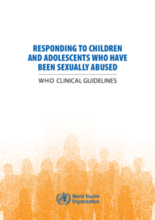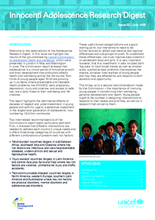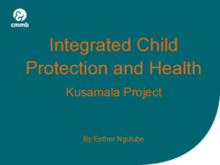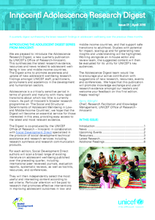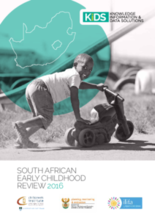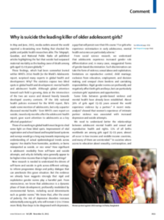Displaying 131 - 140 of 243
This guideline aims to provide evidence-based recommendations for quality clinical care for children and adolescents who have, or may have, been subjected to sexual abuse, in order to mitigate the negative health consequences and improve their well-being.
This issue of Innocenti's Adolescence Research Digest includes recent news, events, and other updates as well as links to some of the latest research on adolescents and violence, health, education, street-connected youth and more.
This presentation by Esther Ngulube of CMMB, given at the Zambia National Consultation to Accelerate Care Reform, outlines the objectives and activities of the Kusamala Project in Zambia and the key learning from this project.
This paper aruges that child welfare agencies (in the US) have an obligation to protect children’s physical and mental well-being, and the social work profession is uniquely qualified to deliver evidence-based obesity mitigation efforts among children in care.
The Adolescence Research Digest is a new quarterly publication by UNICEF’s Office of Research-Innocenti. This synthesizes the latest research evidence, resources and news related to adolescent well-being in low- and middle-income countries.
The purpose of this commentary is to articulate why focusing on both program and context offers policymakers a more promising pathway for achieving meaningful and sustainable improvements in a child’s well-being and healthy development.
This investigation into economic migration of Guatemalan parents shows that the timing of migration events in relation to left-behind children’s ages has important, often negative and likely permanent, repercussions on the physical development of their children.
This report reviews South Africa’s National Integrated Early Childhood Development Policy, which was approved by the Cabinet in December 2015. The policy is aimed at providing a framework for multi-sectoral Early Childhood Development services in South Africa.
This comment from the Lancet discusses the rising rate of suicide among adolescent girls worldwide.
On July 27–29, 2015, the Forum on Investing in Young Children Globally, in partnership with the Ethiopian Academy of Sciences, held a workshop in Addis Ababa, Ethiopia, to examine topics related to supporting family and community investments in young children globally.

